As adults age, their bodies can start to produce new physical and health concerns. One of the most common issues is chronic inflammation, which can lead to other health concerns and a decrease in quality of life. Fortunately, nutrition plays an important role in controlling inflammation in aging and reducing its effects.
Contents
- 1 Everything You Need to Know About Inflammation in Aging?
- 1.1 Prefer to listen rather than read?
- 1.2 Understanding the Aging Process
- 1.3 How Inflammation Can Impact Health in Aging Adults
- 1.4 Nutrition-Focused Anti-Inflammatory Strategies
- 1.5 Reducing Pro-Inflammatory Foods
- 1.6 Increasing Anti-Inflammatory Foods
- 1.7 Supplements to Help With Inflammation in Aging
- 1.8 Working with a Healthcare Team to Achieve Nutritional Goals
- 2 Conclusion
Everything You Need to Know About Inflammation in Aging?
This blog post will provide a guide to anti-inflammatory nutrition for seniors and tips and advice on making dietary changes to reduce inflammation and improve overall health.
By understanding the sources of inflammation in aging, the foods and nutrients that can reduce it, and the lifestyle changes that can help, aging adults can make the dietary changes necessary to reduce it and improve their overall health and well-being.
Prefer to listen rather than read?
Understanding the Aging Process
The aging process is a complex and multi-faceted phenomenon that can be divided into three distinct phases: physiological, psychological, and social. Physiologically, aging is characterized by decreased physical functioning and increased susceptibility to disease. This is due to changes in the body’s organs and tissues, as well as the gradual decrease in the body’s ability to repair itself.
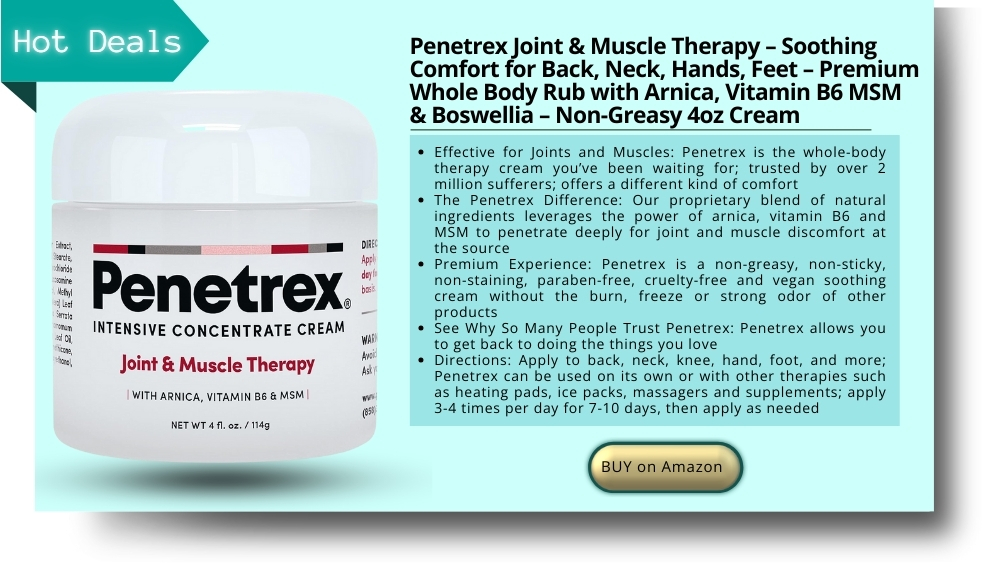
This decline is often seen in the form of physical changes such as wrnkles, thinning hair, grey hair, and decreased muscle mass. It can also manifest in cognitive and psychological changes such as memory loss and difficulty focusing. Physiological aging is an unavoidable process that begins in the mid-thirties and progresses gradually until death.
The aging process is an important factor to consider when creating effective plans for anti-inflammatory nutrition for seniors. As people age, their bodies produce fewer hormones and enzymes, resulting in a slower metabolism.

This means that the body has a harder time breaking down foods, leading to the accumulation of toxins in the body and impeding the absorption of important nutrients. This can lead to a decrease in muscle mass and bone density, as well as an increase in inflammation, which can cause a variety of health issues.
Inflammation is a natural response of the body’s immune system to injury or infection. It is characterized by the release of pro-inflammatory compounds, such as cytokines, leukotrienes, and prostaglandins, which protect the body from harm and promote healing.
How Inflammation Can Impact Health in Aging Adults
Aging is a normal process of life, but it is associated with an increased risk of certain medical issues. One of these issues is inflammation, which is the body’s natural response to injury or infection. In older adults, it can be caused by several different factors, such as chronic diseases, dietary habits, physical activity, and lifestyle choices.
As a result, it can begin to take a toll on their bodies and overall health. Inflammation in aging adults can cause a breakdown of cartilage and muscle tissue, leading to joint pain and mobility issues. It is important for aging adults to understand its impacts on their health and how they can best combat it.
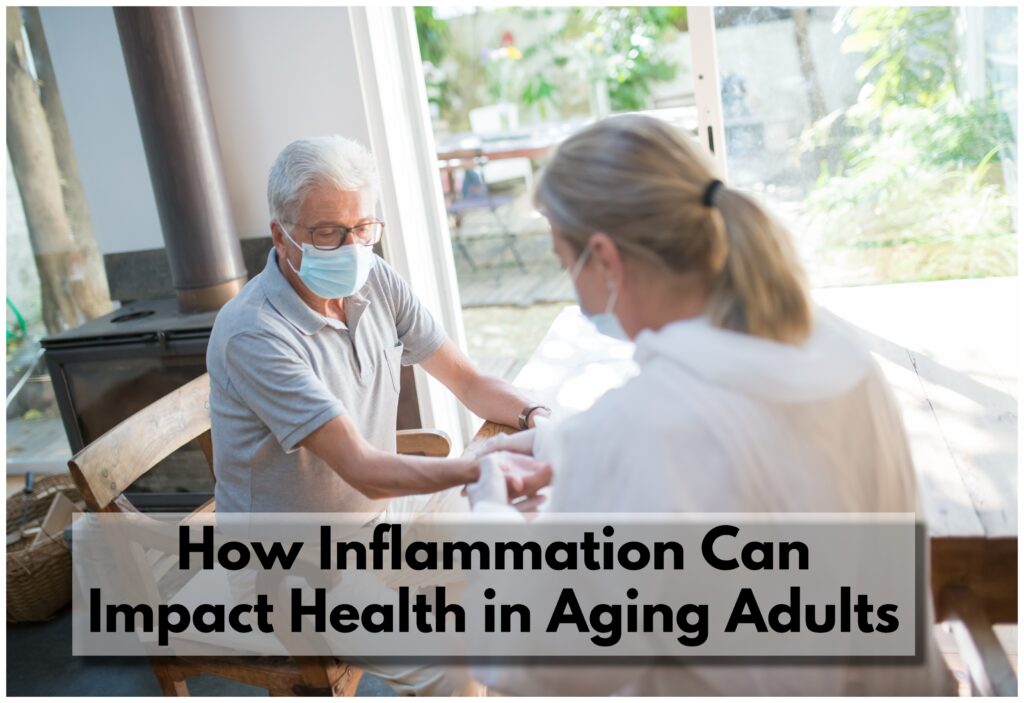
Unfortunately, chronic inflammation in aging caused by the production of these molecules can lead to a number of age-related diseases like cardiovascular disease, stroke, and type 2 diabetes. Pro-inflammatory molecules can also be produced in response to various environmental triggers, such as pollutants, stress, and poor diets.
This can result in an exacerbated inflammatory response, which can lead to several health issues, including an increased risk of chronic diseases as well as asthma. Anti-inflammatory nutrition for seniors is a great way to reduce it and improve overall health in aging adults.
Understanding the body’s natural aging process can help you craft the best anti-inflammatory nutrition for seniors that is individualized to the needs of aging adults, and tailored to the specific health concerns associated with aging.
Nutrition-Focused Anti-Inflammatory Strategies
Nutrition-focused anti-inflammatory strategies are an important part of preventive health care and wellness, as they can help reduce inflammation-related diseases, chronic illnesses, and other health issues. Diet is an important part of controlling inflammation in aging.
Research suggests that certain dietary components, including antioxidants, polyunsaturated fatty acids, and omega-3 fatty acids, have anti-inflammatory properties that can help reduce inflammation. Certain dietary patterns such as the Mediterranean diet have been shown to be associated with reduced levels of inflammation in aging.
Nutrition-focused anti-inflammatory strategies are effective and can play a key role in managing inflammation-related health issues and promoting general well-being. These strategies can reduce the risk of developing chronic conditions such as cardiovascular disease, diabetes, and certain types of cancer.
They can improve symptoms associated with existing conditions, such as arthritis, allergies, asthma, and autoimmune diseases. This is due to their ability to reduce inflammation and oxidative stress, which can contribute to the development and progression of chronic conditions.
Nutrition-focused anti-inflammatory strategies can include dietary modifications, such as decreasing the intake of processed foods and foods high in saturated fat and increasing the intake of foods rich in anti-inflammatory nutrients and phytochemicals, such as fruits, vegetables, and nuts.
In addition to dietary adjustments, increasing your intake of prebiotics and probiotics may help to reduce inflammation in aging and optimize digestion. Prebiotics are indigestible fibres that act as fuel for beneficial bacteria in the gut, while probiotics are live bacteria and yeast that are also beneficial to the gut.
Consuming probiotic-rich foods and supplements can help improve digestion, reduce inflammation in aging, and support the body’s immune system. Probiotics have also been found to help balance the gut microbiome, which is connected to various health conditions.
Furthermore, prebiotic-rich foods may help to stimulate the growth of beneficial bacteria and reduce the growth of harmful bacteria, which can support overall gastrointestinal health.

Reducing Pro-Inflammatory Foods
Reducing pro-inflammatory foods is one of the most important steps in anti-inflammatory nutrition for seniors’ diet plans. This is due to the fact that certain foods can induce inflammation, exacerbating existing conditions such as joint pain, arthritis, heart disease, and other chronic diseases.
The more inflammation present in the body, the more likely it is to cause further damage. That is why reducing the intake of pro-inflammatory foods is key in any diet plan aimed at helping seniors manage chronic conditions and maximize their health.
What are these pro-inflammatory foods?
Pro-inflammatory foods are so-named because of their high content of certain compounds which can trigger the body’s inflammatory response. These compounds include but are not limited to:
Refined Sugars
Refined sugar is one of the most pro-inflammatory foods available because it is highly processed and stripped of all its beneficial nutrients. Refined sugar also has a high glycemic index, which means it is digested quickly and can cause a rapid rise in blood sugar. It is also highly acidic, which can lead to systemic inflammation throughout the body.
High Levels of Saturated and Trans Fat
High levels of saturated and trans fats are among the most prominent pro-inflammatory foods due to their effects on the body’s immune system. Saturated fats, typically found in animal products such as meat and dairy, have been lniked to increased inflammation by affecting the production of pro-inflammatory cytokines.
Trans fats, which are commonly found in processed and fried foods, have been linked to an increased risk of inflammation resulting from their ability to raise levels of low-density lipoprotein (LDL) cholesterol, which is a known risk factor for inflammation in aging. In addition, both saturated and trans fats have been associated with a decrease in anti-inflammatory protective factors, such as omega-3 fatty acids and antioxidants.
Processed Foods
- Processed foods have been linked to increased inflammation in the body due to the high content of refined carbohydrates, trans fats, and sodium.
- Examples of processed foods are:
- Canned Vegetables
- Refined Grains
- Frozen Dinners
- Pre-made Sauces and Dressings
Simple Carbohydrates
- Sugar is a simple carbohydrate that is quickly broken down by the body into glucose, which can spike blood sugar levels and cause inflammation.
- Examples are:
- Sugar
- White Bread
- White Rice
- Saturated Fruit Juice
- Pasta
Limiting or eliminating foods that can trigger inflammation in aging adults is crucial.
Increasing Anti-Inflammatory Foods
Adopting an anti-inflammatory eating plan is an important step to reduce inflammation in aging adults. One of the key components of such a plan is to increase the consumption of anti-inflammatory foods.
These foods are rich in dietary compounds like antioxidants, polyphenols, omega-3 fatty acids, and other micronutrients that help reduce inflammation in aging. Eating these foods daily can help reduce it and improve overall health.

Examples of anti-inflammatory foods include:
Fruits
- Berries (cranberries, strawberries blackberries, and blueberries)
- Apples
- Apples contain a wide range of essential vitamins, minerals, and antioxidants. They are high in Vitamin C. Apples are also a good source of fibre, with about 4.4 grams per medium-sized apple.
- Fibre helps keep the digestive system healthy and balanced, which can reduce inflammation in aging. Apples are also a good source of polyphenols and flavonoids, both of which have been shown to reduce it.
- Potassium, an electrolyte found in apples, helps reduce inflammation in aging, while other minerals like zinc, copper, and magnesium can also help reduce it.
- Avocado
- The avocado is a nutrient-dense fruit that is considered one of the most anti-inflammatory fruits due to its high levels of vitamins, minerals, and antioxidants.
- Avocados are an excellent source of dietary fibre, healthy fats, vitamin K, folate, vitamin C, potassium, and vitamin E.
- Healthy fats in avocados, including monounsaturated and polyunsaturated fats, have been linked to a lower risk of cardiovascular disease and other health issues.
- Citrus
- Citrus fruits such as oranges, lemons, limes, and grapefruits are typically considered anti-inflammatory due to their nutritional content.
- These fruits are abundant in vitamin C, antioxidants, and flavonoids, which are all believed to help reduce inflammation.
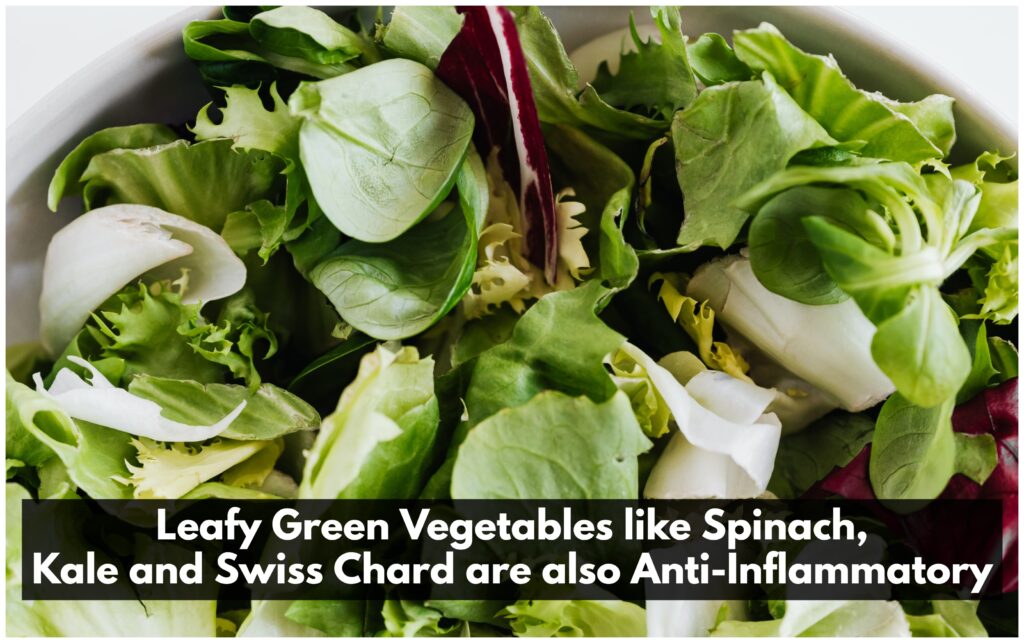
Leafy Green Vegetables
- Spinach
- Spinach is a very nutrient-dense food and is an excellent source of vitamins A, C, and K, as well as folate, potassium, and magnesium. In addition, it is a good source of manganese, zinc, and phosphorous.
- Spinach is also an excellent source of beta-carotene, lutein, and zeaxanthin. These antioxidants have been linked to reducing inflammation and promoting overall health.
- Swiss Chard
- Swiss Chard (Beta vulgaris) is an edible leafy green vegetable that is part of the same family as beets and spinach. It has a slightly bitter and earthy taste and is often used in salads, soups, and stir-fries.
- Nutritionally, it is an incredibly dense source of vitamins, minerals, and antioxidants. Swiss Chard is rich in vitamin K, vitamin A, vitamin C, magnesium, and manganese.
- Kale
- Kale is a leafy green vegetable and is typically found in the cabbage family. It is considered to be one of the most nutrient-dense vegetables due to its high content of vitamins, minerals, antioxidants and fibre.
- Kale is also a great source of Vitamin K, Vitamin A, Vitamin C, Vitamin B6, Manganese, Calcium, Copper, Potassium, Magnesium and Iron.
- It also contains phytonutrients, which have anti-inflammatory properties.
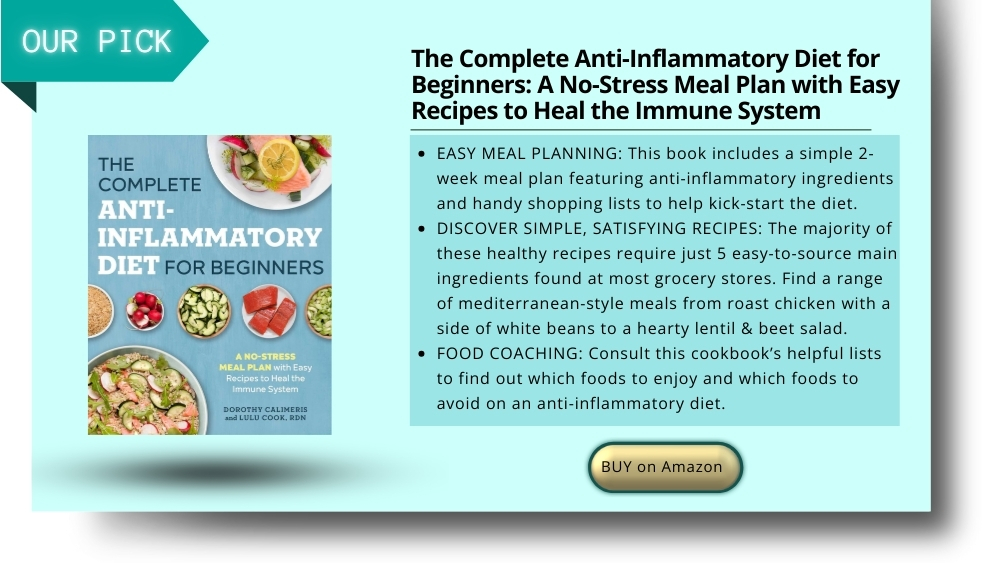
Nuts and Seeds
Nuts and seeds are nutrient-dense foods that are considered anti-inflammatory due to their high content of monounsaturated fats, polyunsaturated fats, plant sterols, vitamins, minerals, and antioxidants.
In terms of the nutritional content of nuts and seeds, they are an excellent source of healthy fats, including oleic acid, linoleic acid, and alpha-linolenic acid.
Fish Rich in Omega-3 Fatty Acids
Examples are Salmon, Trout and Mackerel. Fish, particularly fatty fish, such as salmon, sardines, herring, and mackerel, is one of the most important dietary sources of omega-3 fatty acids, eicosapentaenoic acid (EPA) and docosahexaenoic acid (DHA).
There are several health benefits associated with the consumption of these fatty acids, and they are known to be anti-inflammatory. EPA and DHA have been shown to play an important role in reducing inflammation in aging, and this has been supported by clinical studies.
In addition, omega-3 fatty acids are thought to reduce the risk of developing conditions such as cardiovascular disease, rheumatoid arthritis, and some forms of cancer.

Herbs and Spices for Seasoning
For example, herbs like oregano and rosemary contain rosmarinic acid, which is known to decrease inflammation. Spices such as turmeric, ginger, and cumin are also rich in anti-inflammatory compounds.
These herbs and spices contain essential trace minerals such as magnesium, iron, and zinc. These minerals are important for proper cell function and have been linked to various health benefits, such as boosting immune system function and reducing inflammation.
Eating a variety of anti-inflammatory foods can help to reduce the risk of chronic diseases and promote healthy aging.
Supplements to Help With Inflammation in Aging
Supplementation can be a beneficial tool for reducing inflammation and the associated symptoms. Here are six supplements that may be effective in fighting inflammation in aging:
Omega-3 Fatty Acids
- Fish Oil capsules
- Krill Oil capsules
- Flaxseed Oil capsules
Turmeric Supplements
Turmeric supplements are available in various forms, including capsules and tea. Turmeric capsules typically contain a concentrated dose of curcumin, which may make them a more convenient option for some people. It’s important to choose a high-quality supplement from a reputable brand to ensure that it contains a therapeutic amount of curcumin that helps..
Turmeric tea is another option for those who prefer a more natural approach. To make turmeric tea, simply boil water and add a teaspoon of turmeric powder or grated fresh turmeric root. You can also add other ingredients such as ginger, lemon, or honey for added flavour and health benefits.
Ginger Supplements
If you’re looking for a quick and easy way to get your ginger fix, ginger capsules are the way to go. With a concentrated dose of ginger extract, these little powerhouses pack a serious punch. Just be sure to choose a high-quality supplement from a reputable brand to ensure that you’re getting the best possible benefits.
For those who prefer a more natural approach, ginger tea is a fantastic option. Simply boil some water and add slices of fresh ginger root for a delicious and healthy beverage. And if you’re feeling adventurous, try adding some lemon, honey, or turmeric for an extra boost of flavour and wellness.
Vitamin D
Vitamin D is a versatile supplement that comes in various forms, making it easy to incorporate into your daily routine. Some of the most common forms of vitamin D supplements include capsules, milk, and chewable tablets.
Capsules are a convenient way to take vitamin D, as they can be easily swallowed and provide a concentrated dose of the nutrient. They are available in different strengths, so it’s important to choose the appropriate dosage based on your individual needs and health status.
Milk is another popular form of vitamin D supplement, as it provides an easy and delicious way to increase your intake of this essential nutrient. Many brands of milk are fortified with vitamin D, making it a convenient option for those who prefer to obtain their nutrients through food sources.
Chewable tablets are a great option for those who have difficulty swallowing pills or prefer a more palatable way to take their supplements. These tablets come in various flavours and provide a convenient way to obtain vitamin D on-the-go.
Regardless of the form you choose, it’s important to select a high-quality vitamin D supplement from a reputable brand to ensure that you are getting a therapeutic dose of the nutrient. Additionally, it’s always a good idea to consult with a healthcare professional before starting any new supplement regimen.
Probiotics
Probiotics are live microorganisms that are beneficial to human health, and they can be found in a variety of forms. In addition to probiotic supplements in the form of capsules or powder, probiotics are also available in fermented foods, probiotic beverages, and even yogurt.
Yogurt is a popular probiotic food that contains live cultures of lactic acid bacteria, which may help promote digestive health and boost the immune system. Many brands of yogurt are also fortified with additional probiotic strains to provide an extra boost of beneficial bacteria.
Probiotic capsules and powders are concentrated sources of probiotics that can be easily added to your supplement regimen. They contain specific strains of probiotics that are known to provide various health benefits, such as improving digestive function and boosting the immune system.
Probiotic beverages, such as kefir and kombucha, are also becoming increasingly popular. These drinks are made by fermenting milk or tea with specific strains of bacteria and yeast, resulting in a tangy and slightly effervescent drink that provides a range of potential health benefits.
Fermented foods, such as sauerkraut, kimchi, and pickles, are another great source of probiotics. These foods are made by fermenting vegetables with lactic acid bacteria, which not only provides beneficial bacteria but also enhances the flavour and texture of the food.
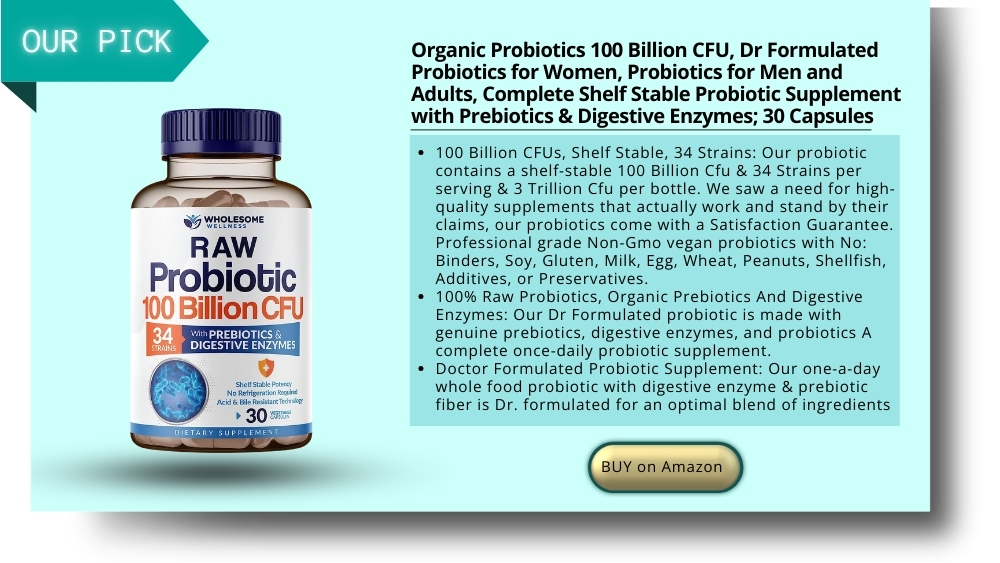
Coenzyme Q10
Coenzyme Q10, also known as CoQ10, is a naturally occurring substance in the body that plays a crucial role in cellular energy production.
Supplementing with CoQ10 can help support healthy aging by providing the body with this important nutrient. CoQ10 is available in supplement form, and it comes in different formulations, including capsules, soft gels, and tablets.
CoQ10 supplements can help reduce inflammation by neutralizing free radicals, which are unstable molecules that can damage cells and contribute to inflammation. Additionally, CoQ10 has been shown to support cardiovascular health and may help reduce the risk of age-related diseases, such as Parkinson’s and Alzheimer’s.
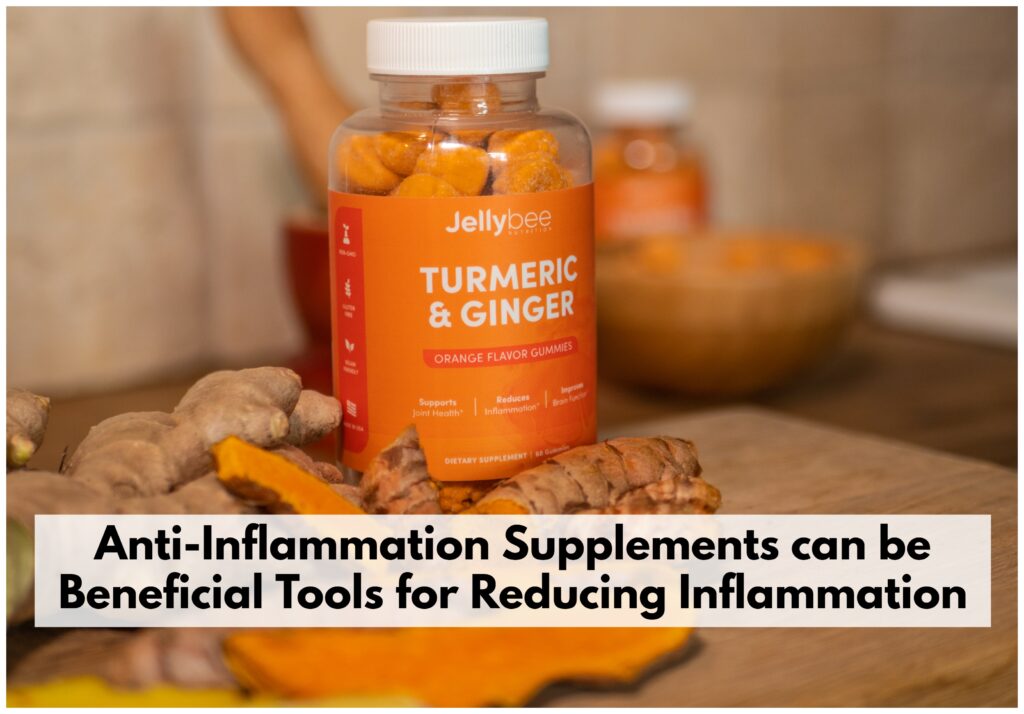
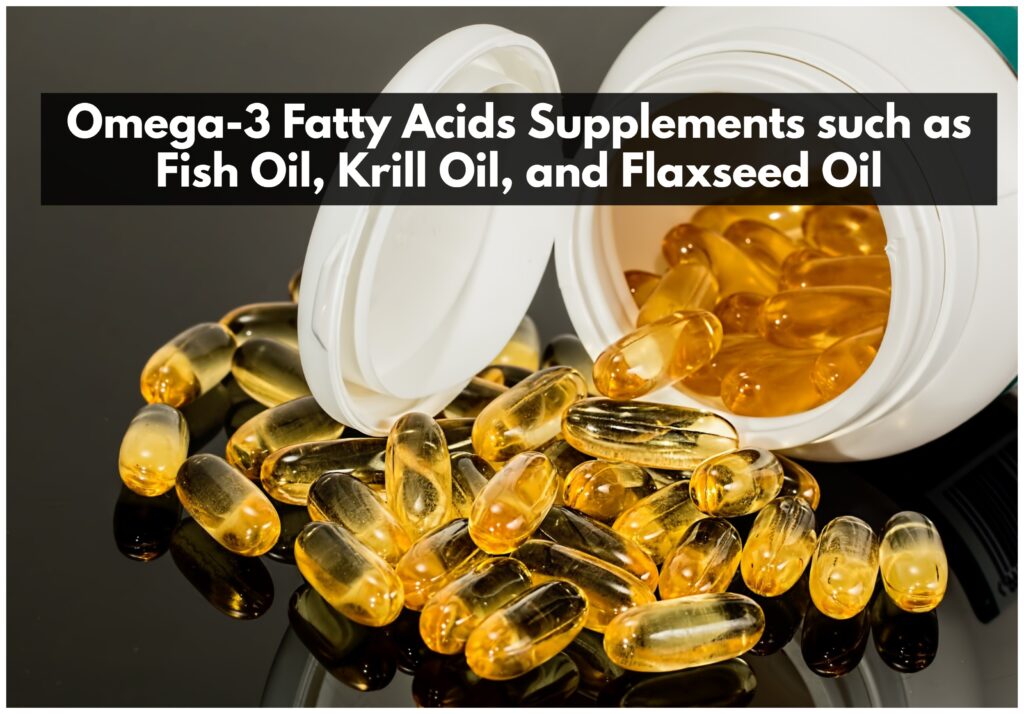
When taking supplements, it is important to follow the instructions on the label and consult a healthcare professional to determine the best dosage for your individual needs.
Working with a Healthcare Team to Achieve Nutritional Goals
Working with a healthcare team to achieve nutritional goals is an essential part of optimizing health in aging adults. Nutritional intervention can help reduce inflammation in aging, improve physical function, and provide an overall sense of well-being.
A healthcare team can also provide individualized guidance, take into account existing health concerns and medications, and ensure taht nutritional needs are being met. Nutritionists, dietitians, and other healthcare professionals can help individuals develop an anti-inflammatory diet plan that fits their lifestyle and health goals.
The healthcare team can provide health education, support, and guidance to ensure that the individual is following the nutrition plan and is able to achieve the desired results. Working with a healthcare team can provide support, accountability, and helpful tips to ensure that nutrition goals are being met.
Conclusion
Anti-inflammatory nutrition is a great way for aging adults to maintain optimal health and well-being. Eating a balanced diet full of fruits, vegetables, nuts and seeds can help reduce inflammation in aging and chronic diseases, while also providing the essential nutrients needed for a healthy lifestyle.
Eating smaller, more frequent meals throughout the day can also help maintain healthy blood sugar levels, which can help reduce inflammation in aging. Lastly, adequate hydration, exercise, stress reduction, and adequate sleep are all key components of a healthy lifestyle that can help reduce inflammation.
Was this post helpful to you? If so, you might also want to read our article about the reasons to start your own business after retirement.



